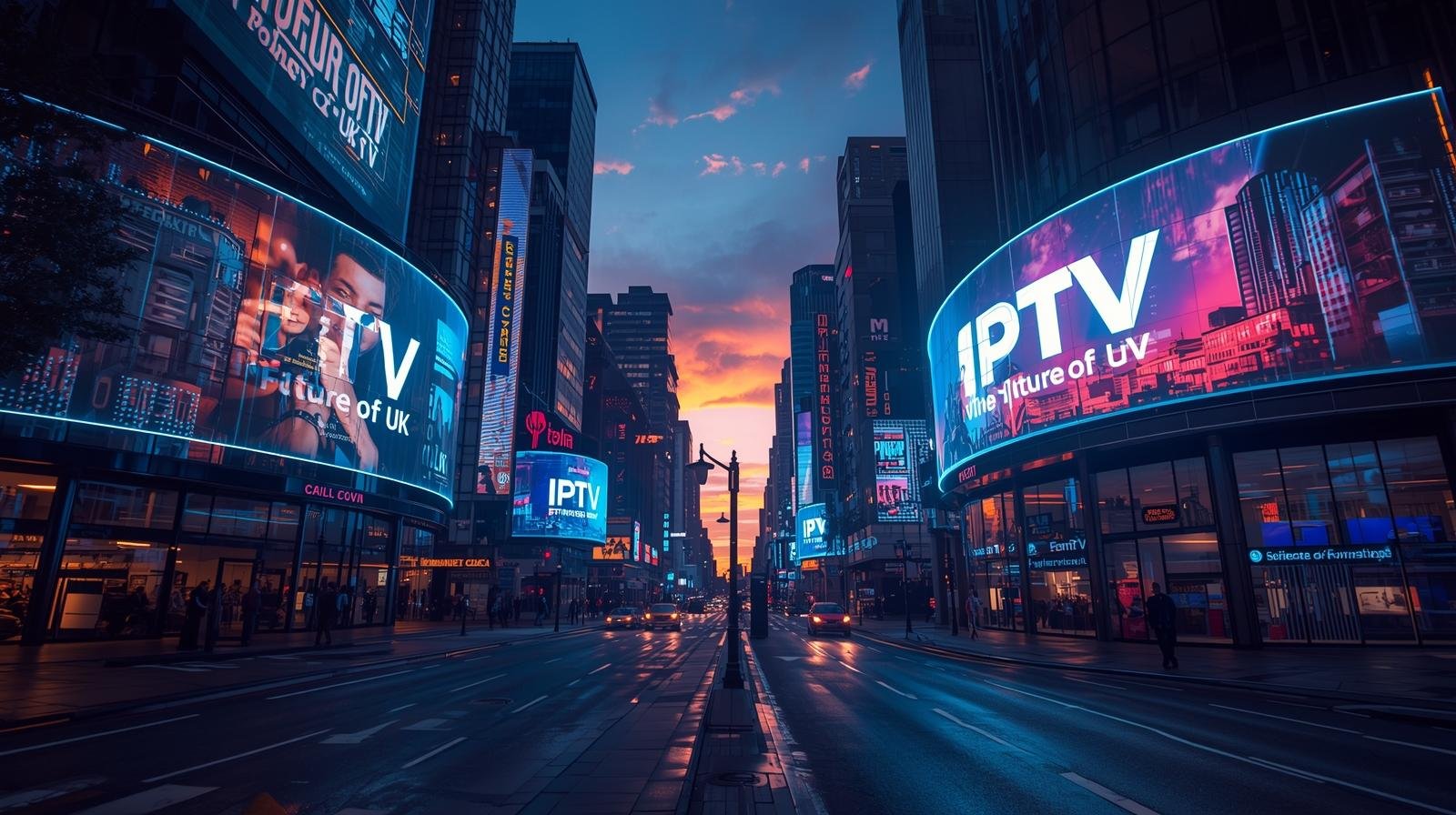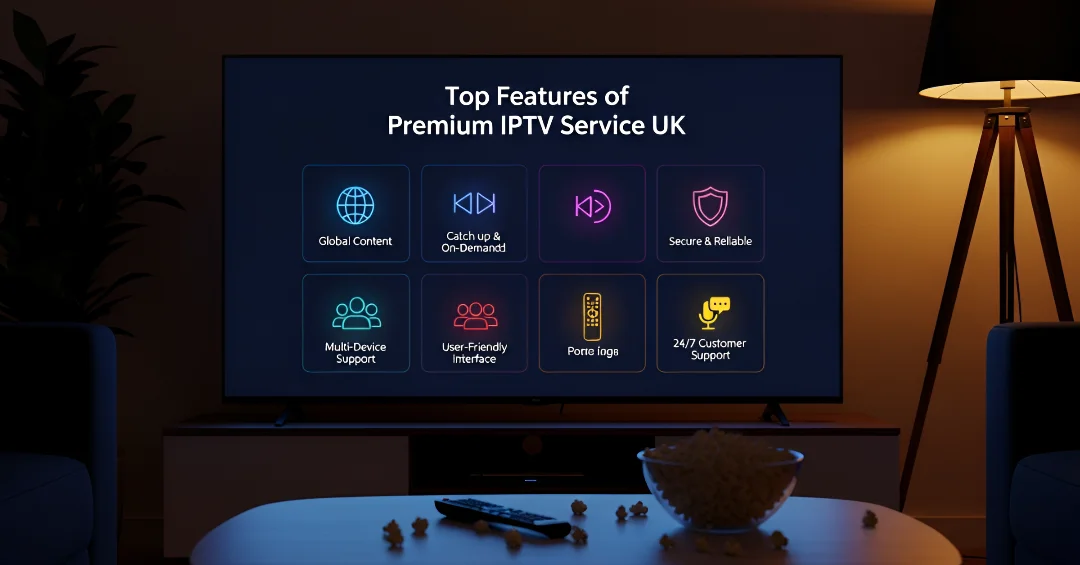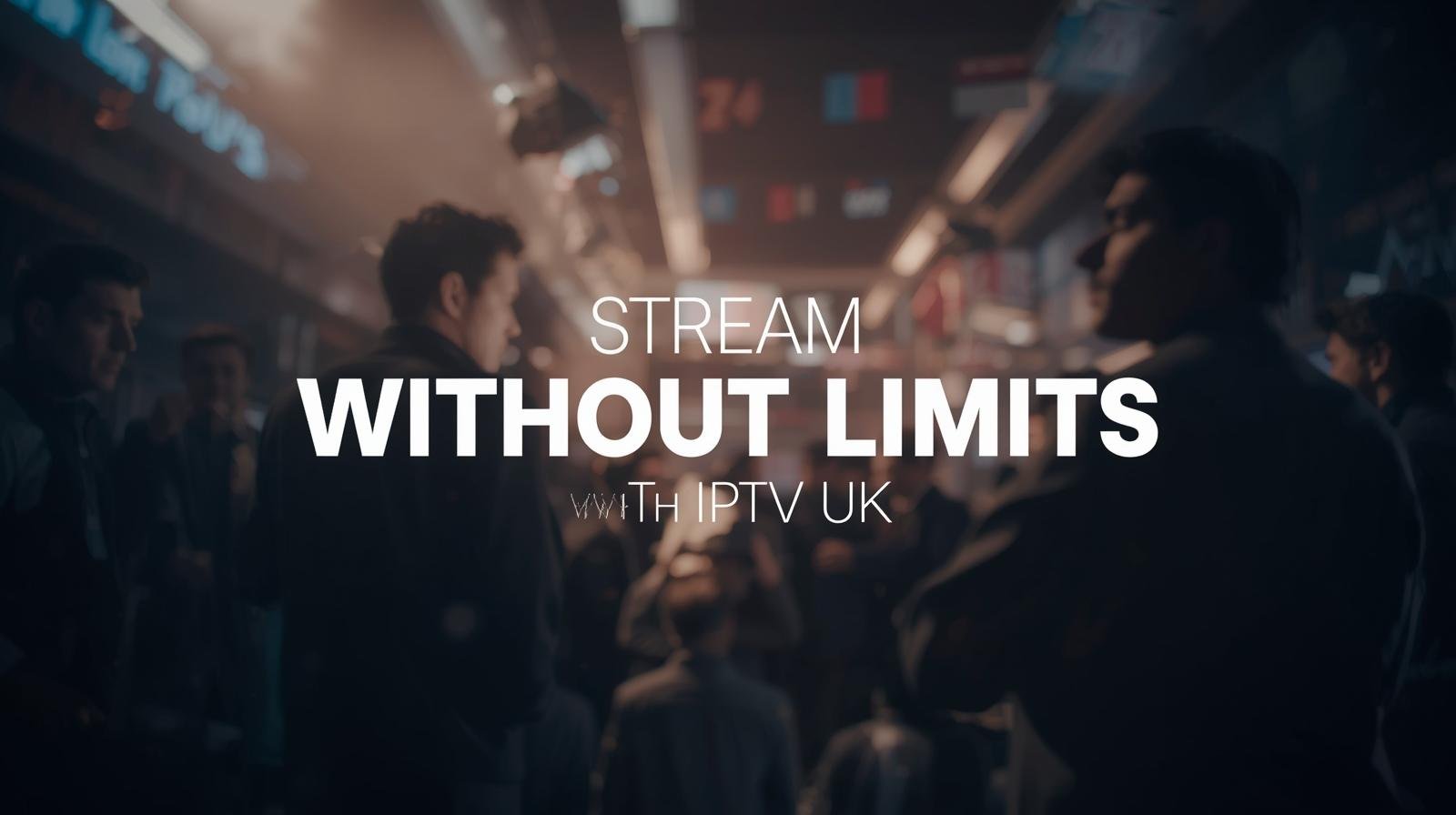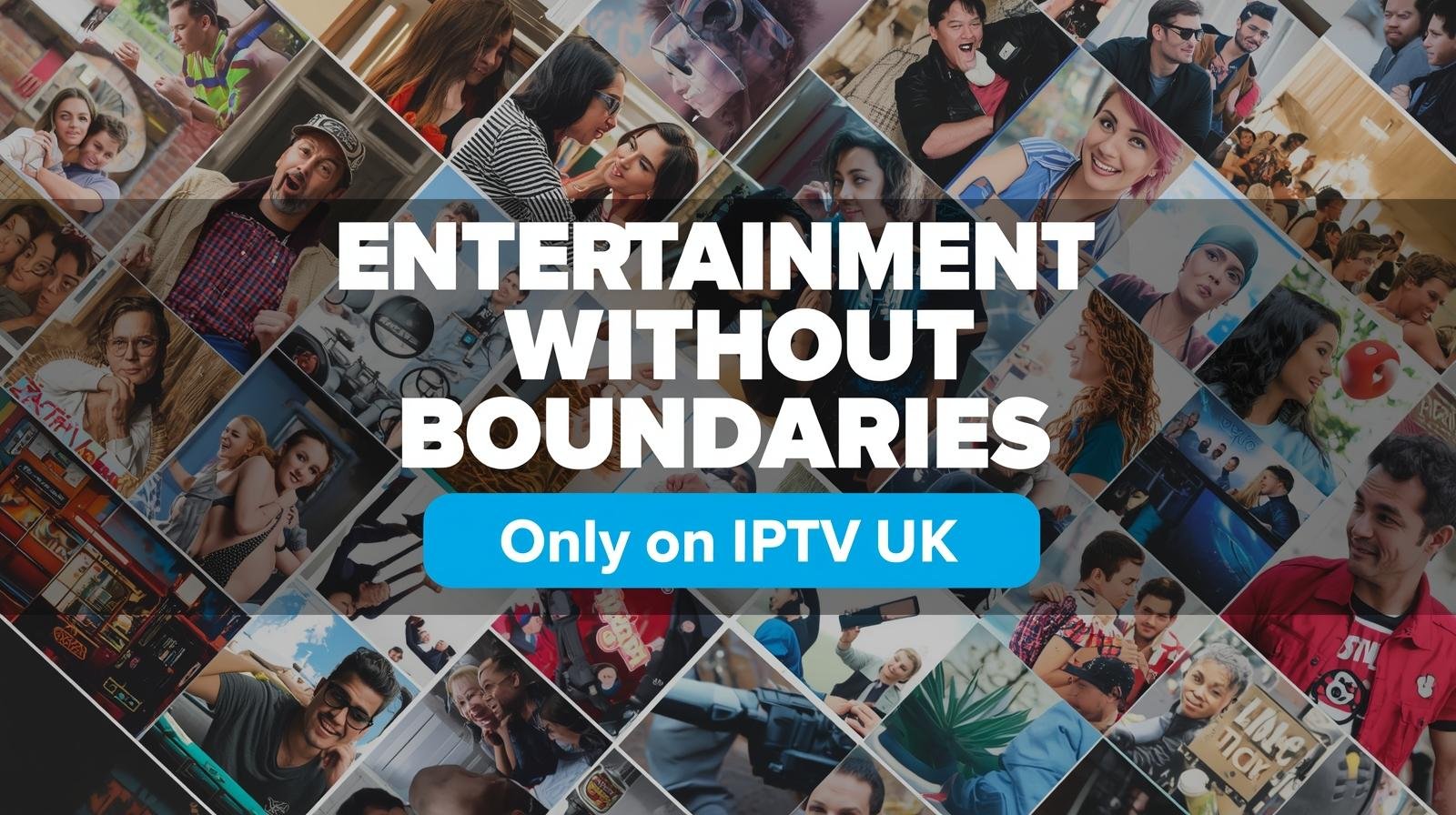1. What is IPTV — plain and practical
IPTV stands for Internet Protocol Television. Instead of using traditional broadcast methods (terrestrial transmitters, satellite dishes, or cable coax), IPTV uses your home internet connection to deliver linear TV channels, on-demand video, and interactive services. That delivery can be from a major broadcaster’s official app (BBC iPlayer, ITVX), a telco-grade managed service (a broadband + TV bundle streaming through a set-top box or app), or via over-the-top (OTT) streaming apps and services. IPTV Future of UK TV.
Put simply: if you watch a “TV channel” through an app on a smart TV, set-top box or streaming stick over your broadband, you are already watching IPTV — even if the provider doesn’t call it that.
2. How IPTV actually works (short technical primer)
IPTV relies on standard internet networking technologies and video codecs. Key pieces:
- Content ingestion and encoding: Broadcasters and content owners prepare live feeds and on-demand video, then encode them using modern video codecs (H.264, H.265/HEVC, AV1 increasingly) so they can be streamed efficiently.
- Content delivery network (CDN): To reach millions of viewers without congestion, providers use CDNs — networks of geographically distributed servers — to cache and deliver streams close to users.
- Adaptive bitrate streaming (ABR): This allows the video quality to change in real time depending on a viewer’s network conditions, so playback stays smooth.
- Client apps and devices: Smart TVs, Android TV boxes, Apple TV, Amazon Fire Stick, mobile phones, web browsers and specialized STBs (set-top boxes) are the endpoints. Many are just apps that request and play HTTP-based video segments.
- Middleware and DRM: IPTV platforms often use middleware (software that manages channel lists, user authentication, EPGs — electronic programme guides) and Digital Rights Management (DRM) to enforce content protection.
The end-user experience: a short delay from a broadcast (latency) compared with satellite may exist, but advancements in protocols and edge delivery continue to narrow the gap. IPTV Future of UK TV.
3. The UK today: why conditions are ripe for IPTV adoption
Several converging trends in the UK make IPTV more feasible and attractive than ever:
- Broadband rollout and speed gains. Full-fibre and gigabit-capable broadband coverage has increased markedly in recent years, improving the infrastructure necessary for high-quality streaming in many households. Ofcom’s Connected Nations updates reported large increases in full-fibre availability across the UK in 2024–2025.
- More time spent on on-demand and mobile video. Ofcom and other surveys show that video-on-demand and online video usage have very high reach among IPTV UK adults — far outpacing older linear habits for younger cohorts. Live TV still matters, but consumption patterns are shifting rapidly toward streamed and on-demand content.
- Average broadband speeds rising. Independent studies found median internet speeds rising substantially, supporting multiple simultaneous HD or even 4K streams in a household. Faster average speeds reduce one of the biggest historical barriers to streaming TV.
- Market growth and investment. Industry reports project strong growth in IPTV and OTT market value globally — signalling investment, innovation and economies of scale that will trickle into the UK market.
Together these structural changes mean that the baseline technical requirements for a good IPTV experience are increasingly present across UK homes.
4. What consumers want now — and how IPTV delivers it
Modern TV viewers want more than passively scheduled channels. IPTV matches contemporary expectations in several ways:
- On-demand control: Catch-up, start-over, and large VOD libraries let viewers watch what they want when they want. Traditional broadcast is inherently schedule-first; IPTV is user-first.
- Personalisation: Profiles, recommendations, and user interfaces that adapt to taste make discovery easier. IPTV platforms can aggregate content across multiple sources and personalize the experience.
- Device flexibility: People want to move seamlessly from living-room TV to phone to tablet. IPTV apps and cloud-based accounts enable cross-device continuity.
- Cost and choice: A la carte bundles, cheaper sport/movie add-ons, and competitive streaming options let households tailor spend in ways cable/satellite rarely allow.
- Interactivity and extras: Integrated catch-up, targeted interactive adverts, pause/rewind for live TV, and enriched programme guides are all natural extensions for IPTV.
- Quality and future features: With better codecs (AV1) and broadband, 4K, HDR and immersive audio for streaming are becoming standard expectations.
IPTV is not just an alternative delivery layer — it enables the product changes viewers have been asking for for years.
5. IPTV vs cable, satellite and broadcast: strengths and trade-offs
No single platform is perfect. Here’s an honest comparison.
Strengths of IPTV
- Flexibility & personalization: User accounts, profiles, and on-demand libraries.
- Lower distribution costs: No need for satellite transponder fees or laying new coax to every home.
- Faster innovation cycles: Apps can be updated rapidly; new features roll out quicker.
- Device agnosticism: Works on smart TVs, sticks, phones, set-top boxes.
- Potentially lower price: Competition among OTT and managed IPTV providers pushes prices down or enables niche bundles.
Weaknesses / trade-offs
- Reliant on broadband: Poor quality or congested networks degrade the experience.
- Latency for live events: For some live broadcasts (sports betting, live news) the small delay matters. Engineering and edge networks are reducing this.
- Fragmentation: Many apps — subscriptions can still add up if consumers subscribe to multiple services.
- Content rights complexity: Not all linear channels or live sports rights are available via every IPTV provider due to licensing.
For the UK, the most likely near-term reality is hybrid: IPTV for most households’ everyday viewing plus satellite/cable/terrestrial where needed for particular live events or legacy bundles. IPTV Future of UK TV.
6. Devices, platforms and the ecosystem that will win
The IPTV “stack” includes three winning classes of players:
- Platform owners and OS-level players — Smart TV OS vendors (Samsung Tizen, LG webOS), Amazon Fire, Roku, Google/Android TV and Apple TV. Whoever provides the cleanest, fastest, and most open app ecosystem typically wins viewer engagement.
- Content aggregators — Services or middleware that combine live channels, catch-up, and VOD into a single, searchable guide. Single-sign-on and universal search across apps matters.
- Telcos and ISPs — Companies that bundle fast broadband with managed IPTV offerings (e.g., operator boxes, dedicated CDNs) have superior quality control and can guarantee SLAs. In markets with strong ISPs, managed IPTV often becomes the “default” TV option.
Hardware trends also matter: low-cost streaming sticks and affordable Android TV boxes have already lowered the barrier to entry; high-quality smart TVs with fast processors and good app stores will make IPTV native in most living rooms.
7. Business models: how operators, broadcasters and platforms will make money
IPTV supports several monetization strategies, often in combination:
- Subscription (SVOD) and transactional (TVOD): Netflix/Prime-style or pay-per-view/film rentals.
- Advertising (AVOD): Ad-supported streams and hybrid ad/subscription tiers. IPTV allows better targeting and measurement than broadcast does.
- Managed B2B bundles: ISPs sell broadband + IPTV bundles as a single product with guaranteed performance.
- Channel packages/skinny bundles: Smaller curated bundles instead of bloated channel lists — appealing to cost-sensitive consumers.
- Premium add-ons: Sports or movie packages, where rights are still premium and can command higher fees.
- Data-driven upsell: Personalisation data helps platforms recommend premium content or bundle upgrades.
This diversity helps content owners and platforms find profitable niches while giving consumers more ways to pay and combine services.
8. Regulation, rights and the UK public interest (what to watch for)
IPTV’s growth triggers regulatory and rights questions:
- Content rights and licensing: Traditional TV rights are time- and territory-bound. Broadcasters and rights holders will negotiate complex deals for live sport and premium event streaming on IPTV platforms . This negotiation affects availability and pricing for consumers.
- Public service broadcasting: The BBC, Channel 4 and others have statutory obligations and existing funding/advertising models. Ensuring PSB content remains widely available and discoverable in an IPTV-dominated landscape is a policy priority.
- Consumer protection and net neutrality: Managed IPTV offerings that prioritise certain traffic (or bundle zero-rated streaming) raise questions about fair competition and consumer choice. Regulators will need to balance investment incentives with open internet principles.
- TV licence and enforcement: As viewing fragments across apps and on-demand, enforcement and clarity about when a TV licence is needed may require revisiting (the licence already applies to watching or recording live programmes on TV sets or devices). Policymakers will need clear communications as habits change.
Regulators (e.g., Ofcom) are already monitoring these shifts and publishing research on media habits and connectivity — decisions here will shape how open and competitive the IPTV future is. IPTV Future of UK TV.
9. Risks and challenges: reliability, piracy, fragmentation, accessibility
While IPTV brings advantages, several risks must be managed.
Reliability and resilience
IPTV depends on fixed broadband networks. During peak times or network incidents, streams can buffer or drop. Managed IPTV over ISP networks with QoS (quality of service) can mitigate that, but pure OTT services are at the mercy of public internet conditions.
Piracy and illegal IPTV services
The ease of streaming also opens the door for illegal IPTV services that rebroadcast premium channels without rights. This harms rights holders and creates security and quality concerns for consumers. Enforcement and consumer education are essential.
Fragmentation and subscription fatigue
Too many apps and walled gardens mean consumers can still feel burdened. Aggregation, universal search, and “bundle management” interfaces will be crucial to keep user experience simple.
Accessibility and inclusion
Older people and those less comfortable with apps can be left behind if IPTV interfaces are not designed inclusively. Accessibility features (subtitles, audio description, simple remotes) must remain a priority.
Local and emergency resilience
Traditional terrestrial broadcast has advantages for resilience in emergencies; any migration strategy must ensure critical public warning and universal access capabilities remain intact.
10. The future scenarios — from mainstream adoption to hybrid TV ecosystems
No single future is guaranteed, but plausible scenarios include:
Scenario A — Mainstream IPTV with managed ISPs leading the way
ISPs bundle robust managed IPTV, users migrate gradually, and traditional cable operators pivot to broadband and aggregation. In this world, linear channels coexist but are delivered primarily over broadband, and high-profile sports and events are increasingly streamed with dedicated low-latency solutions.
Scenario B — Hybrid ecosystem
Broadcast remains important for live mass events (large sports, royal events), but everyday viewing (drama, reality shows, movies, kids content) moves to on-demand IPTV and OTT. Aggregators and search become central to discovery.
Scenario C — Fragmented streaming economy
No single aggregator emerges. Content remains split across SVOD and AVOD apps, and consumers use multiple subscriptions and aggregator apps to manage them. Piracy and rights confusion slow adoption for premium live sport.
The most likely near-term outcome is a blend of A and B: ISPs and major platform owners take a lead, while broadcasters adapt their distribution strategies and rights deals to ensure presence across IPTV channels. IPTV Future of UK TV.
11. Practical guidance: what UK households should consider now
If you’re deciding whether to switch to IPTV or prepare for the transition, here’s a practical checklist:
Check your broadband
IPTV quality depends on speed and reliability. For single HD streaming, 5–10 Mbps is a baseline; for 4K, target 25–40 Mbps or higher. If you have multiple users/streaming devices, aim for more. Ofcom and industry reports show UK broadband capacity improving, but regional variation remains — check local full-fibre availability.
Choose the right hardware
Smart TVs with fast processors, or a streaming stick/box (Fire TV, Chromecast with Google TV, Apple TV, Android TV boxes) provide the best app support and updates. If you prefer a managed experience, an operator-provided STB can be worth it for guaranteed performance and simpler billing.
Consider bundling with your ISP
Bundled broadband + TV from an ISP often includes a managed IPTV solution (with a single bill and support). These can be competitively priced and simpler for families.
Evaluate content needs
If live sports or specific channels are essential, check availability on IPTV services before switching. Some premium sports rights can still be exclusive to satellite or restricted platforms.
Mind accessibility and parental controls
Ensure apps and devices provide subtitles, audio description and robust parental controls. IPTV systems often make these features easier to manage centrally.
12. How broadcasters and rights owners should be thinking now
Broadcasters face both threat and opportunity:
- Embrace platform diversity. Be present where viewers are: native apps on smart TVs, major streaming devices, and aggregated guides.
- Negotiate flexible rights. Rights contracts must evolve to cover streaming, device types, and international distribution, while protecting revenue for premium live events.
- Invest in metadata and discovery. If you want viewers to find your shows, invest in metadata, search partnerships, and cross-platform discovery deals.
- Monetize smartly. Mix subscription, ad-supported and transactional options rather than betting on a single revenue model.
- Protect the public service remit. PSBs should secure mechanisms that keep flagship content accessible and discoverable, even as distribution fragments.
13. The role of ISPs, CDN providers and edge computing
ISPs and CDN providers will be the operational backbone of mass IPTV:
- ISPs can offer managed IPTV with traffic prioritization, lower latency, and better support — a major differentiator for customers who value reliability (e.g., households that watch lots of live sports).
- CDNs and edge computing reduce latency and the bandwidth load on origin servers by caching content closer to users. This enables scalable live streams and better performance at peak times.
- Peering and interconnect strategy will matter: providers that optimize network routes and peerings will deliver better end-user experiences.
Investment in these layers is part of why industry analysts and market studies are bullish on IPTV growth — the infrastructure is being built. IPTV Future of UK TV.
14. International lessons and UK specifics
Countries with broad fibre rollout and strong OTT ecosystems often see faster IPTV adoption. The UK’s particularities:
- High OTT consumption already. UK audiences spend substantial time on VOD and online video services, especially younger demographics, creating natural demand for IPTV features and formats.
- A strong PSB ecosystem. The presence of BBC, ITV, Channel 4, Channel 5 and their funding/rights frameworks means policymakers will watch transitions closely to protect public value.
- A competitive broadband market. Multiple ISPs and regulatory attention to fibre rollout create incentives and competition for bundled IPTV offers — accelerating consumer choice.
15. Addressing common objections
“IPTV will never match live sports on satellite.”
Latency used to be a real gap, but low-latency streaming techniques and edge delivery can shrink the difference. For extreme real-time use cases (certain betting scenarios) ultra-low latency may still favour satellite or specialized direct feeds for now — but the gap is closing.
“My area has poor broadband.”
That’s changing: full-fibre rollout is accelerating, but coverage is uneven. In places where high-speed broadband is unavailable, satellite/cable or hybrid models may persist longer. Check local connectivity maps before switching fully.
“I don’t want multiple subscriptions.”
Aggregation tools and operator bundles aim to simplify this. Expect more aggregator interfaces that let you manage subscriptions centrally and search across services.
16. A realistic five-year roadmap for the UK TV market
- Now–1 year: Continued rapid growth of OTT and managed IPTV trials from ISPs. Increased investment in CDNs and platform apps.
- 1–3 years: Mainstream households begin choosing IPTV-first setups; broadcasters adapt app-first distribution for new shows; aggregator apps gain traction.
- 3–5 years: Mature hybrid models: most daytime and on-demand viewing is IPTV-based; premium live events are streamed with dedicated low-latency workflows; PSBs secure redistributable streaming presences.
- Beyond 5 years: IPTV and OTT account for the majority of viewing minutes; broadcast transmitters still play a role for emergency messaging and universal free-to-air events, but the majority of distribution is internet-based.
These timelines depend on continued broadband rollout, viable business models for rights owners, and regulatory frameworks that protect competition and public interest. IPTV Future of UK TV.
17. What could slow adoption — watchlist for industry watchers
- Slower broadband rollout than projected in some regions would slow mass migration.
- Unresolved rights negotiations for big live events could keep large audiences on legacy platforms.
- Major network reliability incidents causing consumer mistrust in streaming for key live events.
- Regulatory restrictions that limit operators’ ability to bundle or prioritise traffic in ways that fund infrastructure investment.
However, market incentives — lower distribution costs, consumer demand for on-demand features, and investment in infrastructure — will push stakeholders to solve these problems.
18. Final thoughts — why IPTV is not “maybe” but “very likely”
IPTV uk brings together the technical capability (broadband + CDNs + codecs), the consumer demand (on-demand, personalization, device flexibility), and the business frameworks (bundles, ad-funded tiers, SVOD) necessary for the next major phase of TV. IPTV Future of UK TV. The UK’s improving broadband infrastructure, clear shifts in viewing habits, and a strong app/device ecosystem make the UK especially well-placed for IPTV to become the dominant delivery method for most TV viewing.
That doesn’t mean the end of broadcast television tomorrow. Live, national-scale events, and those with particular regulatory or resilience needs will still have a role for the foreseeable future. But for everyday viewing — drama, films, kids content, news, and increasingly sport — IPTV is the delivery system that matches what modern viewers want and how modern networks operate.
Selected supporting sources (key evidence)
- Ofcom — “Further findings from our latest look at the UK’s media habits” (media habits, high VOD usage and changing viewing patterns).
- Ofcom — Connected Nations / nation reports (broadband rollout and full-fibre availability rising across the UK).
- Uswitch / broadband studies — median average internet speed and consumer connectivity stats supporting higher-quality streaming.
- Market research — IPTV market growth projections indicating significant investment and scale-up of IPTV and OTT services.
- The Guardian / industry news — reporting shifts in time spent on mobile video vs traditional TV, underscoring changing habits.
Appendix — Quick checklist for consumers (one-page)
- Check local broadband: aim for 25–40 Mbps for reliable HD/4K and multiple-device households.
- If you want plug-and-play reliability, consider ISP-managed IPTV bundles.
- If you prefer choice, get a smart TV or a streaming stick with strong app support.
- Compare availability of the channels/sports you care about across providers before switching.
- Prioritise devices with good accessibility features and parental controls. IPTV FREE TRIAL









